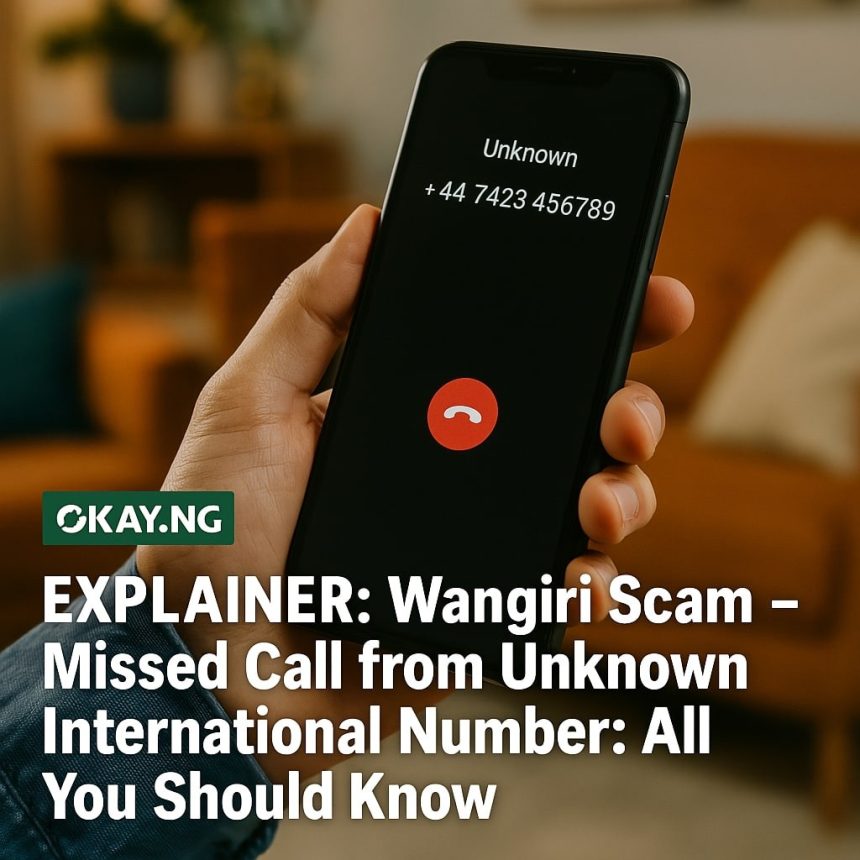Have you ever received a missed call from an unknown international number that rang only once? If so, you may have been targeted by the Wangiri scam—a clever and costly form of telecom fraud that has spread globally.
This article explains what the Wangiri scam is, how it works, how to identify it, and most importantly, how to protect yourself and others.
What is the Wangiri Scam?
Wangiri is a Japanese word that means “one ring and cut.” This term perfectly describes the nature of this scam, which involves scammers calling your phone, letting it ring once, and then hanging up.
The goal? To trick you into calling back. Once you do, you’re connected to a premium-rate number that can rack up serious charges in a matter of seconds.
How the Wangiri Scam Works
Here’s a breakdown of the typical flow of this scam:
- Step 1: Auto-Dialing
Scammers use auto-dialing systems to call thousands of random numbers globally. They let the phone ring just once. - Step 2: Missed Call Notification
The recipient sees a missed call from a foreign number and becomes curious or concerned. - Step 3: Callback by Victim
If the victim returns the call, they are connected to a high-tariff line, often disguised as a customer service or survey line. - Step 4: High Charges Applied
The victim is charged heavily per minute, and the scammer takes a share of the revenue generated.
How to Identify a Wangiri Scam
Here are common signs to help you spot a Wangiri scam:
- One-ring calls from international or unfamiliar numbers
- Multiple missed calls in a short period from different foreign numbers
- Numbers that start with country codes from distant or uncommon countries
Common Country Codes Used in Wangiri Scams
Scammers often use international dialing codes to appear legitimate or to trick victims into thinking it’s an urgent call. Below are some country codes that have been commonly used in past Wangiri scams:
| Country | Country Code |
|---|---|
| Moldova | +373 |
| United Kingdom | +44 |
| France | +33 |
| Tunisia | +216 |
| Kosovo | +383 |
| Cuba | +53 |
Note: Scammers are constantly changing country codes, so this list is not exhaustive.
Why the Wangiri Scam Is Dangerous
The Wangiri scam isn’t just about annoying calls—it can lead to:
- Financial Losses: Victims can be charged thousands of naira/dollars depending on call duration and network charges.
- Privacy Concerns: Scammers may collect data such as call-back numbers, which can be used for further fraud.
- Phone Network Exploitation: Telecom providers and regulators lose revenue and trust due to the misuse of international calling networks.
How to Protect Yourself from the Wangiri Scam
Protecting yourself is as easy as being aware and cautious:
- Don’t return unknown international calls, especially those that rang only once.
- Use call-blocking apps that identify spam numbers and stop repeated scam calls.
- Enable call reporting features offered by your mobile network.
- Regularly review your phone bills for any unexplained charges.
- Educate your family and colleagues—many victims are caught unaware.
What to Do If You Fall Victim
If you accidentally call back a suspicious number:
- End the Call Immediately – Every second counts in minimizing charges.
- Contact Your Network Provider – Report the number and request an investigation or refund if applicable.
- Block the Number – Prevent further calls from the same scammer.
- Stay Alert – Once you’re targeted, you may be targeted again. Remain cautious moving forward.
Summary Table: Wangiri Scam at a Glance
| Aspect | Details |
|---|---|
| Scam Name | Wangiri (Japanese for “one ring and drop”) |
| Main Tactic | Missed international calls to prompt a costly callback |
| Victim Loss | High call-back charges to premium-rate numbers |
| Common Country Codes Used | +373, +216, +33, +44, +53, +383 |
| Scam Objective | Revenue sharing from premium rate calls |
| How to Avoid | Never call back unknown international missed calls |
| Action if Victimized | Contact your network, block number, monitor phone bills |
Final Thoughts
The Wangiri scam thrives on curiosity and urgency. In an age where people rely heavily on their phones for business and personal communication, falling for a one-ring scam can be both costly and frustrating.
By staying informed and cautious, you can protect yourself, your loved ones, and your money. When in doubt—don’t call back.












